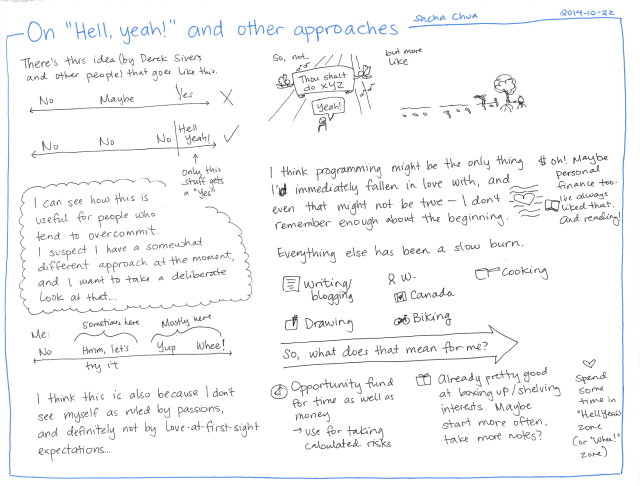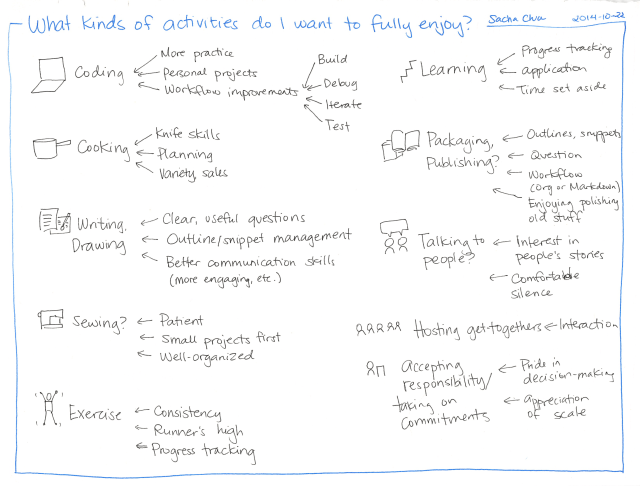Scribe and tinker
| passion, purpose, reflectionI've been figuring out more about what tickles my brain and what I want to do with my life.
On one hand, I'm a scribe. I like extracting, organizing, and connecting ideas. I like getting stuff out of my head and into a form that I can work with or share with other people. I often like helping get stuff out of other people's heads too. This explains my fascination with blogging, sketchnoting, personal knowledge management, and processes. To get better at this, I can focus on skills like:
- Asking questions
- Finding resources
- Making sense
- Connecting and building on ideas
- Organizing
- Communicating
- Archiving
On the other hand, I'm a tinker. I like tweaking things to make them better. It's not about big inventions, but small, continuous improvements. This explains my fascination with Emacs, Quantified Self, open source, and general geeking around. To get better at this, I can focus on skills like:
- Seeing problems and possibilities
- Estimating, prioritizing, and evaluating
- Setting up experiments
- Connecting ideas
- Learning techniques
- Coding
- Tweaking physical things
If I look at the intersection of being a scribe and being a tinker, that explains my interest in:
- Building/tweaking systems to help me capture, organize, connect, and share knowledge
- Writing about experiments and lessons learned
What would it look like to be very, very good at these things? It's quite convenient that I'm into knowledge work, since I can learn from millennia of people passionate about that. Tinkering shows up in entrepreneurship and invention, so I have plenty of role models there, too. I could probably spend a lifetime learning as much as I can from Benjamin Franklin and similar people.
How does parenting influence this? What can I gain from being the primary caregiver of a young child?
I've taken advantage of my push towards externalizing memory to work out a daily/weekly/monthly/yearly journaling workflow that works for me, and a way to think about questions in the scattered moments I have for myself. It took a bit of figuring out and there are things I still want to improve about my process. Chances are that there are other similarly-inclined people who could benefit. I wonder what things could be like if we could get better at thinking, capturing, and sharing at this stage. I don't expect that I'll come up with some brilliant insights. Most of my notes are about everyday life or my own questions. Still, I notice that this process seems to be good for my mental health, and it's okay for me to explore ideas slowly especially if I get better at building on ideas instead of going around in circles. I can let the tough meaning-making be handled by people like Pulitzer-prize journalists (surely there must be quite a few who have also been or will become primary caregivers) and people who have different life arrangements (like part-time daycare), and I can focus on the questions I'm particularly curious about or the things that are uncommon about our experiments.
As for tinkering, there are tons of improvement opportunities exposed by the demands of parenting. If I keep track of the pain points/opportunities and work on improving my skills, I'll probably grow at just the right pace. It would be interesting to improve my quick-experiment rate. Reading and thinking give me lots of things to try in terms of parenting, and talking to other people might help a lot too. W- is a good mentor for quick DIY and household things. It's a little harder to do quick programming tweaks at the moment, but that can wait until I can concentrate more. I've set up my phone so that I can do some things through it, so I can consider the tradeoff between coding on my phone versus using the time to write.
I think I can make this work so that the time and energy I'll devote to A- over the next couple of years can count for other goals, too. The more clearly I understand myself, the more effectively I can use my time and attention. I'm looking forward to seeing where writing more can take me, since I can do that while A-‘s nursing. During the day, it could be good to explore improvements to our physical environment and our processes, since A- can appreciate those too. There'll be time for other things later, as A- becomes more capable and more independent. Onward!




